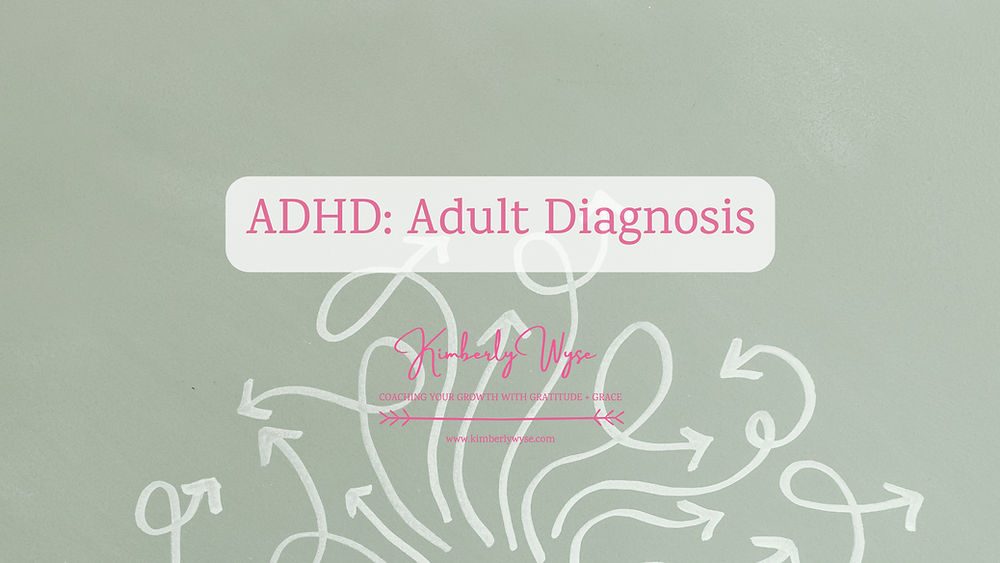Dealing With A Potential Adult ADHD Diagnosis

Table of Contents
Recognizing the Signs of Adult ADHD
Many adults live with undiagnosed ADHD, unaware that their challenges with focus, organization, and impulse control are symptoms of a treatable condition. Understanding the signs of Adult ADHD is the first step towards seeking help. While symptoms vary greatly from person to person, some common indicators include:
Inattention Symptoms
Adults with ADHD may experience inattention that significantly impacts their daily lives. This might manifest as:
- Difficulty sustaining attention in tasks or conversations: Finding it hard to concentrate on work projects, conversations, or even leisure activities.
- Frequently losing things: Misplacing keys, wallets, documents, or other essential items regularly.
- Disorganization and forgetfulness: Struggling to manage time, meet deadlines, or remember appointments.
- Difficulty organizing tasks and activities: Overwhelmed by even simple to-do lists, leading to procrastination and missed deadlines.
- Easily distracted: Being sidetracked by minor interruptions or irrelevant stimuli.
Hyperactivity and Impulsivity Symptoms
Beyond inattention, hyperactivity and impulsivity are other key symptoms of Adult ADHD. These might present as:
- Restlessness and fidgeting: Constantly moving, tapping, or feeling the need to be on the go.
- Interrupting conversations: Blurting out thoughts or comments without considering the context.
- Difficulty waiting one's turn: Impatience and trouble delaying gratification.
- Impulsive decision-making: Acting without thinking through the consequences.
- Excessive talking: Speaking rapidly and frequently, sometimes dominating conversations.
The Importance of Professional Assessment
It's crucial to remember that self-diagnosing Adult ADHD is unreliable. These symptoms can overlap with other conditions, making professional assessment essential. A qualified healthcare professional can provide an accurate Adult ADHD diagnosis through:
- Detailed clinical interviews: Discussing your symptoms, history, and challenges.
- Psychological testing: Utilizing standardized assessments to measure attention, impulsivity, and hyperactivity.
- Review of medical history: Ruling out other potential underlying conditions.
Seeking Professional Help for Adult ADHD
Once you suspect you might have Adult ADHD, the next step is seeking professional help. This involves finding the right specialist and navigating the diagnostic process.
Finding the Right Specialist
Several healthcare professionals can diagnose and treat Adult ADHD, including:
- Psychiatrists: Medical doctors specializing in mental health who can prescribe medication.
- Psychologists: Experts in mental health who can provide therapy and conduct assessments.
- Neuropsychologists: Specialists who assess cognitive functioning and can help diagnose ADHD and related conditions.
The Diagnostic Process
The diagnostic process usually involves:
- Completion of questionnaires: Self-report measures assessing ADHD symptoms.
- Clinical interviews: Detailed discussions with the professional about your symptoms and history.
- Neuropsychological testing (sometimes): More in-depth cognitive assessments to rule out other conditions.
Navigating Insurance and Costs
The cost of assessment and treatment for Adult ADHD can vary greatly depending on your insurance coverage and the type of services you need. It's advisable to:
- Contact your insurance provider: To understand your coverage for ADHD diagnosis and treatment.
- Inquire about payment options: Many clinicians offer various payment plans or accept different insurance providers.
Treatment Options for Adult ADHD
Effective management of Adult ADHD often involves a combination of approaches.
Medication Management
Stimulant and non-stimulant medications are frequently used to help manage ADHD symptoms. These medications can improve focus, reduce impulsivity, and increase attention span. However, it’s vital to discuss potential side effects with your doctor.
Therapeutic Interventions
Therapy, particularly Cognitive Behavioral Therapy (CBT), can be highly beneficial. CBT helps individuals develop coping mechanisms and strategies for managing their ADHD symptoms. Other therapies, such as coaching and support groups, can also provide valuable support.
Lifestyle Changes
Lifestyle modifications can play a significant role in managing Adult ADHD. These include:
- Regular exercise: Improving focus and reducing hyperactivity.
- Healthy diet: Optimizing brain function and energy levels.
- Sufficient sleep: Improving cognitive function and mood regulation.
- Stress management techniques: Minimizing the impact of stress on ADHD symptoms.
Coping with a Diagnosis of Adult ADHD
Receiving an Adult ADHD diagnosis can be emotionally challenging, but it's also an opportunity to gain understanding and develop strategies for better management.
Accepting the Diagnosis
Self-acceptance and self-compassion are crucial. Recognize that ADHD is a treatable condition, not a personal failing.
Building a Support System
Connecting with others who understand what you're going through can be incredibly helpful. Support groups, family, and friends can provide valuable emotional support and practical advice.
Developing Coping Strategies
Developing coping strategies is essential for managing ADHD symptoms. These might include:
- Time management techniques: Prioritizing tasks, breaking down large projects into smaller steps, and using timers.
- Organization tools: Utilizing planners, calendars, and other tools to improve organization.
- Mindfulness practices: Developing techniques for focusing attention and managing impulsivity.
Conclusion
Dealing with a potential Adult ADHD diagnosis can be challenging, but with the right support and treatment, it is possible to manage symptoms effectively and live a fulfilling life. Understanding the signs, seeking professional help, and exploring available treatment options are crucial steps in managing Adult ADHD. Remember, you are not alone. By taking proactive steps and utilizing the resources available, you can successfully navigate this journey. Take the first step today and seek a professional assessment for a potential Adult ADHD diagnosis.

Featured Posts
-
 Anthony Edwards And Ayesha Howard Custody Battle Outcome
Apr 29, 2025
Anthony Edwards And Ayesha Howard Custody Battle Outcome
Apr 29, 2025 -
 Sejarah Porsche 356 Asal Usul Dan Pabrik Zuffenhausen Jerman
Apr 29, 2025
Sejarah Porsche 356 Asal Usul Dan Pabrik Zuffenhausen Jerman
Apr 29, 2025 -
 The Surprising Link Between Charles Barkley And A Ru Pauls Drag Race Contestant
Apr 29, 2025
The Surprising Link Between Charles Barkley And A Ru Pauls Drag Race Contestant
Apr 29, 2025 -
 How To Secure Capital Summertime Ball 2025 Tickets A Step By Step Guide
Apr 29, 2025
How To Secure Capital Summertime Ball 2025 Tickets A Step By Step Guide
Apr 29, 2025 -
 Dubais Khazna Targets Saudi Market After Silver Lake Partnership
Apr 29, 2025
Dubais Khazna Targets Saudi Market After Silver Lake Partnership
Apr 29, 2025
